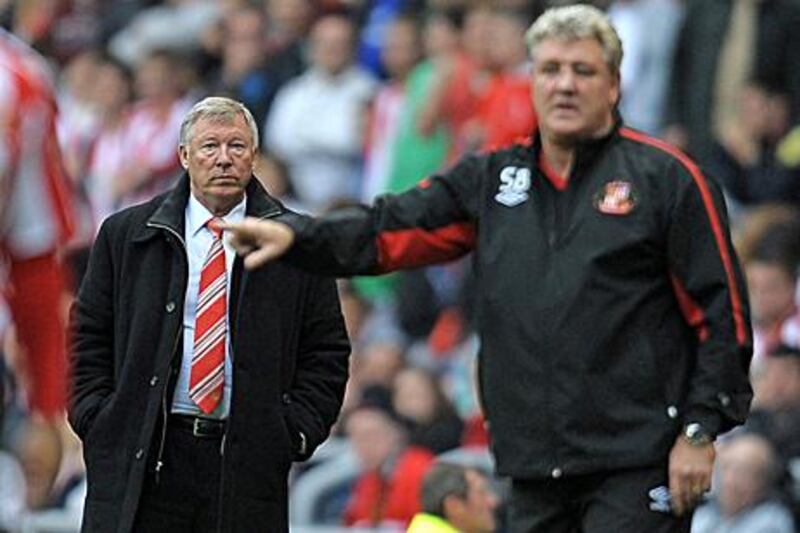In 1974, an ageing centre-forward stepped on to the first rung of the managerial leader. He inherited an East Stirlingshire side with precisely eight players. It is too few, as even the most casual football fan needs no reminding, to constitute a team.
More than 36 years, over 2,000 games and the small matter of 46 trophies later, Sir Alex Ferguson turns 69 this week. He does so able to field a full 11 of his former players, albeit without a goalkeeper, who are employed as managers themselves, even without taking into account Eric Cantona's occasional and undemanding responsibilities with France's Beach Soccer team.
And he does so by welcoming one of the most distinguished of them back to Old Trafford. Steve Bruce, the former United defender and how Sunderland manager, shares a birthday with his mentor, just as they shared in success for much of the decade they spent together at United.
"The big Geordie was a banker, one of the dourest and most dependable defenders ever to play for me," Ferguson said in his autobiography, Managing My Life.
"His resolution was mingled with warmth and modesty, so that he commanded respect and affection in equal measure. He led by example."
It is a reason Bruce is always welcomed back to his former home. Another is a dismal record against Ferguson. Sixteen games have brought four draws and 12 defeats. Approaching 50, the ageing apprentice is yet to conquer the old master.
The one consolation is that Bruce is getting closer. He entered injury time in the lead at Old Trafford last season, before Anton Ferdinand's own goal preserved Ferguson's unbeaten record against his former captain.
In October's stalemate at the Stadium of Light, the United manager admitted his side were fortunate to escape defeat and described it as their toughest away game of the season.
If the gap is closing, the majority may be more preoccupied with worrying to repeat a cheeky request.
In 2005, with Birmingham City heading for a 3-1 defeat, their manager responded to the United fans' chorus of "Brucie, give us a wave." The absent-minded acknowledgement brought boos from the home supporters.
Routine wins, however, are what Ferguson has come to expect. His former charges rarely upset him: 74 games against nine of them in all competitions have brought a mere five defeats.
In 24 Premier League meetings on home turf, Ferguson has only lost twice: once each to Bryan Robson and Mark Hughes.
Even then, there is a mitigating circumstance: the United manager was at his sister-in-law's funeral when Robson's Middlesbrough triumphed at Old Trafford in 1998.
As Bruce argues, it helps to have good players, an advantage Ferguson invariably possesses. The results alone would suggest he still has a psychological hold, too.
They also indicate that the Scot's alchemy is not transferable; an inferiority complex may be a sign of inferior managers.
By taking Sunderland into the top six, Bruce is bucking a trend. Hughes and Alex McLeish are nearer the relegation zone, Roy Keane and Darren Ferguson in danger of the sack in the Championship.
Rewind a few years and the assumption was that Liverpool's boot room contained magical qualities and that all who entered it would be imbued with wisdom. The managerial careers of John Barnes, Ian Rush, Phil Neal, Ronnie Whelan and Mark Lawrenson would indicate otherwise.
Now, with his proteges everywhere, the temptation is to brand Ferguson the godfather or, for those who prefer images of Marlon Brando and Al Pacino as models of Machiavellian ruthlessness, 'the Godfather'. Son Darren's January appointment at Preston increased the suggestion of a family business, especially in a year when five United players were sent to Deepdale on loan.
That is an extreme example but United's emerging talents can be farmed out to his former players: Danny Welbeck, scorer of five goals in six games but ineligible today, is at Sunderland, where Keane both borrowed and bought from his old club during his time on Wearside.
Ferguson, in turn, arranged to sign Antonio Valencia from Wigan when Bruce was there. Their closeness may provide a clue about the possible destination of Jordan Henderson, Sunderland's highly-rated midfielder.
Ferguson has a vested interest almost everywhere, exerting influence behind the scenes at many clubs. He recommended Bruce, along with Hughes, to Wigan owner Dave Whelan in 2007, and can generally be relied upon for advice and encouragement (unless, as Hughes did, they choose to manage Manchester City, when the lines of communication do break down).
When the Welshman left Eastlands, Ferguson was among the first to call. Those 18 months nevertheless gave Hughes an insight into their evolving relationship.
"He likes to make sure we know our place," he explained in August. "And rightly so. He is always competitive and to come up against guys he has worked with and brought through, he has a lot of affection for them and he is always supportive.
"But he always likes to beat them, that's for sure. Invariably he picks his strongest team against me. Maybe that's a sign of respect because he knows I set up my teams to give them a hard time."
Hughes' return of two wins in 13 games against United is not outstanding, but it is far superior to Bruce's. Men who spent years taking tips from Ferguson are still searching for the formula to beat him.
7pm, Abu Dhabi Sports 5






